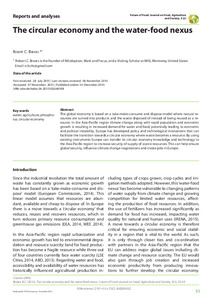The circular economy and the water-food nexus
| dc.date.accessioned | 2016-01-05T10:17:21Z | |
| dc.date.available | 2016-01-05T10:17:21Z | |
| dc.date.issued | 2015-12-16 | |
| dc.identifier.issn | 2197-411X | |
| dc.identifier.uri | urn:nbn:de:hebis:34-2015102649198 | |
| dc.identifier.uri | http://hdl.handle.net/123456789/2015102649198 | |
| dc.language.iso | eng | |
| dc.publisher | Department of Organic Food Quality and Food Culture at the University of Kassel, Germany and Federation of German Scientists (VDW) | ger |
| dc.rights | Urheberrechtlich geschützt | |
| dc.rights.uri | https://rightsstatements.org/page/InC/1.0/ | |
| dc.subject | water | ger |
| dc.subject | agriculture | ger |
| dc.subject | phosphorus | ger |
| dc.subject | circular economy | ger |
| dc.subject.ddc | 630 | |
| dc.title | The circular economy and the water-food nexus | ger |
| dc.type | Aufsatz | |
| dcterms.abstract | The global economy is based on a take-make-consume and dispose model where natural resources are turned into products and the waste disposed of instead of being reused as a resource. In the Asia-Pacific region climate change along with rapid population and economic growth is resulting in increased demand for water and food, potentially leading to economic and political instability. Europe has developed policy and technological innovations that can facilitate the transition towards a circular economy where waste becomes a resource. By using existing instruments Europe can transfer its circular economy knowledge and technology to the Asia-Pacific region to increase security of supply of scarce resources. This can help ensure global security, influence climate change negotiations and create jobs in Europe. | ger |
| dcterms.accessRights | open access | |
| dcterms.bibliographicCitation | In: Future of Food: Journal on Food, Agriculture and Society. Witzenhausen : University of Kassel, Department of Organic Food Quality and Food Culture. - Vol. 3, No. 2 (2015), S. 53 - 59 | |
| dcterms.creator | Brears, Robert C. |

